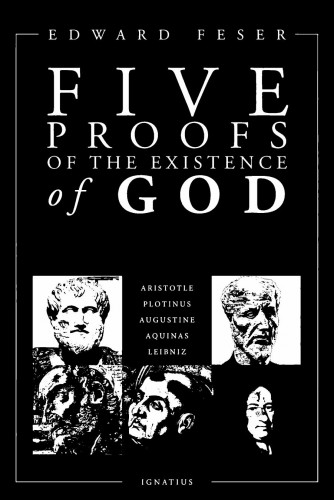
Feser - Five Proofs of the Existence of God
This is not a book about Saint Thomas Aquinas’ Five Ways. Some readers of my earlier books might have supposed otherwise, given that I have defended Aquinas’ arguments elsewhere and that the title of this book is Five Proofs of the Existence of God.
But though there is certainly some overlap with what Aquinas says and with what I have said in other places, this book stakes out somewhat different ground. It is not new ground, exactly, insofar as none of the proofs I will discuss is original with me. But it is different ground insofar as several of these proofs are arguments I have not previously defended at any length. It is also different in that most of these proofs have not received much attention in contemporary philosophy. This is remarkable, given that they have been very prominent historically, and given that they happen to be the most powerful arguments for God’s existence on offer (or so I think). My longtime readers will not be surprised when I say that in my view this tells you nothing about the proofs themselves and everything about the state of contemporary academic philosophy, including philosophy of religion.
Though the arguments are not new in themselves, then, they will be new to most readers, as will much of what I have to say in defense of them. What is distinctive about this book will perhaps be most easily explained by saying something about its origins. In my earlier books The Last Superstition and Aquinas, and elsewhere, I approached questions of natural theology—that is to say, questions about what might be known via unaided human reason, apart from divine revelation, concerning the existence and nature of God and of his relationship to the world—by way of exposition and defense of what Aquinas had to say on the subject.
Edward Feser - Five Proofs of the Existence of God
2017 by Ignatius Press, San Francisco
ISBN 978-1-62164-133-9
Edward Feser - Five Proofs of the Existence of God - Contents
Acknowledgments
Introduction
1 The Aristotelian Proof
2 The Neo-Platonic Proof
3 The Augustinian Proof
4 The Thomistic Proof
5 The Rationalist Proof
6 The Nature of God and of His Relationship to the World
7 Common Objections to Natural Theology
Further Reading
Index
Edward Feser - Five Proofs of the Existence of God - The Neo-Platonic Proof
Informal statement of the argument: Stage 1
The things of our experience are made up of parts. Suppose you are sitting in a chair as you read this book. The chair is made up of parts, such as the chair legs, the screws that hold the legs to the frame of the chair, the seat and back of the chair, and a cushion and the fabric that covers it. The book itself is made up of parts, such as the cover, the pages, the glue that secures the pages to the cover, and the ink on the pages. You are yourself made up of parts, such as your arms and legs, eyeballs and ears, bones and muscles, and all the rest.
There is a sense in which, in each of these cases, the parts are less fundamental than the whole. After all, we understand what a leg or an eyeball is by reference to the whole organism whose leg or eyeball it is. A leg is something which helps an organism to move about, and an eyeball is something which allows the organism to have visual experiences of objects in its surrounding environment. The parts of the book and the chair are also to be understood by reference to the whole. A book cover is something that protects the pages of the book and indicates, via the words written on it, the author of the book and something of the book’s contents. A chair leg is something which holds the chair up, a cushion something that functions to make the chair comfortable for the person sitting in it, and so forth.
Still, there is obviously also another sense in which each of these wholes is less fundamental than its parts. For the whole cannot exist unless the parts exist and are combined in the right way. For example, if there were no chair legs, no frame, or no seat, the chair would not exist. Neither would it exist if these parts were simply thrown in a pile or put together in the form of a table (say), rather than assembled into a chair, specifically. Similarly, the book would not exist if the pages, cover, glue, and so forth did not exist, or if they existed but were scattered across a field. Your body would not exist if your arms, legs, eyes, ears, bones, muscles, and so forth were similarly scattered across the field or lumped together into a big pile, instead of being configured in the normal way.
So, the things of our experience are composite, or composed of parts. And a composite is less fundamental than its parts in the sense that its existence presupposes that its parts exist and are put together in the right way. You might think that this has essentially to do with there being some point in time at which the parts are not assembled into the whole, and then later on they are so assembled. And that is true in many cases. For example, the parts of a chair are made first and then assembled into a chair. But it is not true in every case. In the case of the human body, for example, it isn’t that the arms, legs, eyes, and ears all come into existence first and are then assembled into a body. Rather, they all develop together as cells divide while you gestate within the womb. Moreover, a composite thing would be less fundamental than its parts in the relevant sense even if it had never come into existence but somehow had always existed. For instance, even if a certain chair had always existed, it would still be true that its existence presupposes that its parts exist and are put together in the right way. For that matter, it would also depend on its parts even if it had not existed always, and not been assembled over time either, but instead came into existence altogether and all at once.





Комментарии
Пока нет комментариев. Будьте первым!